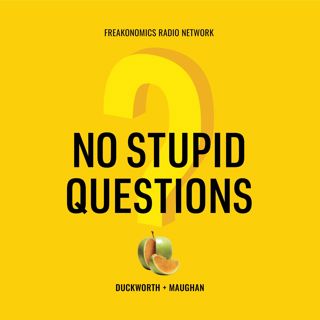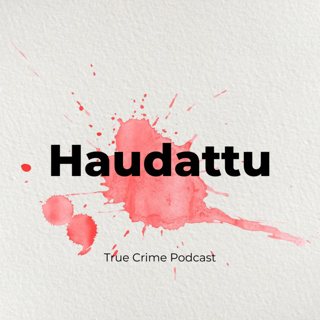
171. Where Is the Line Between Exaggeration and Lying?
Why do we use “literally” figuratively? Does conveying an "emotional truth" justify making things up? And are Angela’s kids really starving or just hungry? RESOURCES:"My Response to The New Yorker Article," by Hasan Minhaj (YouTube video, 2023)."Hasan Minhaj’s 'Emotional Truths,'" by Clare Malone (The New Yorker, 2023)."Lying to Spice up Life," by Holly Cole (Society for Personality and Social Psychology, 2019).Words on the Move: Why English Won't - and Can't - Sit Still (Like, Literally), by John McWhorter (2016)."Literally," entry by Deathmatch1127 (Urban Dictionary, 2015)."Does Living in California Make People Happy? A Focusing Illusion in Judgments of Life Satisfaction," by David A. Schkade and Daniel Kahneman (Psychological Science, 1998).The Giver, by Lois Lowry (1993).EXTRAS:"Swearing Is More Important Than You Think," by Freakonomics Radio (2023)."The Ugly Truth of Fast Fashion," S5.E3 of Patriot Act with Hasan Minhaj (2019).SOURCES:Holly Cole, assistant professor of psychology at Wesleyan College.Daniel Kahneman, professor emeritus of psychology and public affairs at Princeton University.Mark Liberman, professor of linguistics and computer and information science at the University of Pennsylvania.Lois Lowry, author.John McWhorter, professor of English and comparative literature at Columbia Unviersity.Hasan Minhaj, comedian. Hosted by Simplecast, an AdsWizz company. See pcm.adswizz.com for information about our collection and use of personal data for advertising.
12 Marras 202334min

170. Are We Getting Lonelier?
How can you be lonely when so many people showed up at your birthday party? Can you fight loneliness by managing expectations? And where can you find company while enjoying the best garlic cheeseburger in the greater Salt Lake City metro area? RESOURCES:"Surgeon General: We Have Become a Lonely Nation. It’s Time to Fix That," by Vivek H. Murthy (The New York Times, 2023)."Home Alone: More Than A Quarter of All Households Have One Person," by Lydia Anderson, Chanell Washington, Rose M. Kreider, and Thomas Gryn (United States Census Bureau, 2023)."Loneliness Before and During the COVID-19 Pandemic: A Systematic Review With Meta-Analysis," by Mareike Ernst, Daniel Niederer, Antonia M. Werner, Sara J. Czaja, Christopher Mikton, Anthony D. Ong, Tony Rosen, Elmar Brähler, and Manfred E. Beutel (American Psychologist, 2022)."Loneliness Across Time and Space," by Maike Luhmann, Susanne Buecker, and Marilena Rüsberg (Nature Reviews Psychology, 2022).Will, by Will Smith with Mark Manson (2021)."Loneliness and Social Isolation in the United States, the United Kingdom, and Japan: An International Survey," by Bianca DiJulio, Liz Hamel, Cailey Muñana, and Mollyann Brodie (KFF, 2018)."Work and the Loneliness Epidemic," by Vivek Murthy (Harvard Business Review, 2017)."The Lonely City: Adventures in the Art of Being Alone," by Maria Popova (The Marginalian, 2016).EXTRAS:"Is It Harder to Make Friends as an Adult?" by No Stupid Questions (2023)."The Side Effects of Social Distancing," by Freakonomics Radio (2020)."Is There Really a 'Loneliness Epidemic'?" by Freakonomics Radio (2020).SOURCES:Wendell Berry, novelist and poet.Ty Burrell, actor.William James, 19th-century psychologist.Vivek Murthy, Surgeon General of the United States.Maria Popova, essayist, author, and poet.Will Smith, actor and film producer. Hosted by Simplecast, an AdsWizz company. See pcm.adswizz.com for information about our collection and use of personal data for advertising.
5 Marras 202330min

169. Can We Disagree Better?
Do you suffer from the sin of certainty? How did Angela react when a grad student challenged her research? And can a Heineken commercial strengthen our democracy? RESOURCES:"Disagree Better," National Governors Association initiative led by Spencer Cox (2023-2024)."Cooling Heated Discourse: Conversational Receptiveness Boosts Interpersonal Evaluations and Willingness to Talk," by Julia Minson, David Hagmann, and Kara Luo (Preprint, 2023)."Megastudy Identifying Effective Interventions to Strengthen Americans’ Democratic Attitudes," by Jan G. Voelkel, Robb Willer, et al. (Working Paper, 2023).Conflicted: Why Arguments Are Tearing Us Apart and How They Can Bring Us Together, by Ian Leslie (2021)."How to Disagree Productively and Find Common Ground," by Julia Dhar (TED, 2018)."From the Fundamental Attribution Error to the Truly Fundamental Attribution Error and Beyond: My Research Journey," by Lee Ross (Perspectives on Psychological Science, 2018)."The Humanizing Voice: Speech Reveals, and Text Conceals, a More Thoughtful Mind in the Midst of Disagreement," by Juliana Schroeder, Michael Kardas, and Nicholas Epley (Psychological Science, 2017)."Worlds Apart," ad by Heineken (2017)."Gritty Educations," by Anindya Kundu (Virginia Policy Review, 2014).Thinking, Fast and Slow, by Daniel Kahneman (2011)."Experiences of Collaborative Research," by Daniel Kahneman (American Psychologist, 2003).EXTRAS:TikTok with advice from Apple Store employee (2023)."Can You Change Your Mind Without Losing Face?" by No Stupid Questions (2022).12 Angry Men, film (1957).SOURCES:Spencer Cox, governor of Utah and chair of the National Governors Association.Julia Dhar, managing director and partner at Boston Consulting Group.David Hagmann, professor of management at Hong Kong University of Science and Technology.Daniel Kahneman, professor emeritus of psychology and public affairs at Princeton University.Anindya Kundu, professor of educational leadership at Florida International University.Ian Leslie, British journalist and author.Kara Luo, Ph.D. candidate in organizational behavior at Stanford University.Julia Minson, professor of public policy at Harvard University.Pedro Noguera, professor of education and dean of the Rossier School of Education at the University of Southern California.Jared Polis, governor of Colorado.Lee Ross, professor of psychology at Stanford University.Julia Schroeder, professor of management of organizations at the University of California, Berkeley.Jared Smith, co-founder of Qualtrics.Anne Treisman, professor of psychology at Princeton University.Jan Voelkel, Ph.D. candidate in sociology at Stanford University. Hosted by Simplecast, an AdsWizz company. See pcm.adswizz.com for information about our collection and use of personal data for advertising.
29 Loka 202338min

168. Would You Be Happier if You Were More Creative?
Should you become an artist or an accountant? Did Sylvia Plath have to be depressed to write The Bell Jar? And what can Napoleon Dynamite teach us about the creative life? RESOURCES:"The Science of Why You Have Great Ideas in the Shower," by Stacey Colino (National Geographic, 2022)."So, You Think You’re Not Creative?" by Duncan Wardle (Harvard Business Review, 2021)."The Correlation Between Arts and Crafts and a Nobel Prize," by Rosie Cima (Priceonomics, 2015)."Report: State of the American Workplace," by Gallup (2014)."Poverty Impedes Cognitive Function," by Anandi Mani, Sendhil Mullainathan, Eldar Shafir, and Jiaying Zhao (Science, 2013)."Forks in the Road: The Many Paths of Arts Alumni," by the Strategic National Arts Alumni Project (2011)."A Meta-Analysis of 25 Years of Mood-Creativity Research: Hedonic Tone, Activation, or Regulatory Focus?" by Matthijs Baas, Carsten K. W. De Dreu, and Bernard A. Nijstad (Psychological Bulletin, 2008)."The Relationship Between Creativity and Mood Disorders," by Nancy C. Andreasen (Dialogues in Clinical Neuroscience, 2008)."The Broaden-and-Build Theory of Positive Emotions," by Barbara Fredrickson (Philosophical Transactions of the Royal Society B, 2004)."Happiness and Creativity: Going With the Flow," by Mihaly Csikszentmihalyi (The Futurist, 1997).EXTRAS:"Why Are Rich Countries So Unhappy?" by No Stupid Questions (2022)."Do You Really Need a Muse to Be Creative?" by No Stupid Questions (2021)."Does All Creativity Come From Pain?" by No Stupid Questions (2020)."How To Be Creative," series by Freakonomics Radio (2018-2019)."How to Be Happy," by Freakonomics Radio (2018).Napoleon Dynamite, film by Jared Hess (2004).The Bell Jar, by Sylvia Plath (1963).Connections, game by The New York Times. SOURCES:Stephen Covey, author.Mihaly Csikszentmihalyi, professor of psychology and management at Claremont Graduate University.Barbara Fredrickson, professor of psychology at the University of North Carolina at Chapel Hill.Sigmund Freud, psychologist and founder of psychoanalysis.Jared Hess, filmmaker.Abraham Maslow, 20th-century psychologist.Sylvia Plath, 20th-century poet and novelist.Martin Seligman, professor of psychology at the University of Pennsylvania.Duncan Wardle, former head of Innovation and Creativity at the Walt Disney Company. Hosted by Simplecast, an AdsWizz company. See pcm.adswizz.com for information about our collection and use of personal data for advertising.
22 Loka 202331min

167. Is GPS Changing Your Brain?
Is it better to be an egocentric navigator or an allocentric navigator? Was the New York City Department of Education wrong to ban ChatGPT? And did Mike get ripped off by Michael Jackson’s cousin? RESOURCES"Don’t Ban Chatbots in Classrooms — Use Them to Change How We Teach," by Angela Duckworth and Lyle Ungar (Los Angeles Times, 2023)."How GPS Weakens Memory — and What We Can Do about It," by Mar Gonzalez-Franco, Gregory Dane Clemenson, and Amos Miller (Scientific American, 2021)."Habitual Use of GPS Negatively Impacts Spatial Memory During Self-Guided Navigation," by Louisa Dahmani and Véronique Bohbot (Nature Scientific Reports, 2020)."Navigational Strategy May Be More a Matter of Environment and Experience Than Gender," by Sharon A. Livingstone-Lee, Philip M. Zeman, Susan T. Gillingham, and Ronald W. Skelton (Learning and Motivation, 2014)."Acquiring 'the Knowledge' of London's Layout Drives Structural Brain Changes," by Katherine Woollett and Eleanor Maguire (Current Biology, 2011)."Is Google Making Us Stupid?" by Nicholas Carr (The Atlantic, 2008).EXTRAS"Dunder Mifflin Infinity," S4.E2 of The Office (2007).SOURCES:Véronique Bohbot, professor of psychiatry at McGill University.Nicholas Carr, journalist and writer.Winston Churchill, 20th-century Prime Minister of the United Kingdom.Louisa Dahmani, research fellow at Harvard Medical School and Massachusetts General Hospital.Jason Duckworth, president of Arcadia Land Company and Angela's husband.Omar Johnson, founder of ØPUS United, former C.M.O. of Beats by Dre and former V.P. of Marketing at Apple.Eleanor Maguire, professor of cognitive neuroscience at University College London.Michael Scott, fictional character and protagonist of NBC sitcom The Office.Socrates, ancient Greek philosopher.Hieronimo Squarciafico, 15th-century Venetian editor.Lyle Ungar, professor of computer and information science at the University of Pennsylvania.Katherine Woollett, clinical psychologist at the Kings College London Hospital. Hosted by Simplecast, an AdsWizz company. See pcm.adswizz.com for information about our collection and use of personal data for advertising.
15 Loka 202337min

166. Are You Suffering From Burnout?
What’s the difference between being busy and being productive? Would you be better at your job if you cared a little less? And can somebody get Mike a cup of coffee? RESOURCES:"State of the Global Workplace: 2023 Report," (Gallup, 2023)."What’s Really So Wrong About Secretly Working Two Full-Time Jobs at Once?" by Alison Green (Slate, 2023)."The Problem With Venting," by Ethan Kross (Character Lab, 2021)."Conan O'Brien's Final Monologue: 'Nobody in Life Gets What They Thought They Were Going to Get,'" by Lynette Rice (Entertainment Weekly, 2020)."Employee Burnout, Part 1: The 5 Main Causes," by Ben Wigert and Sangeeta Agrawal (Gallup, 2018)."Finding Solutions to the Problem of Burnout," by Christina Maslach (Consulting Psychology Journal: Practice and Research, 2017)."Maslach Burnout Inventory: Third Edition," by Christina Maslach, Susan E. Jackson, and Michael P. Leiter (Evaluating Stress: A Book of Resources, 1997).Burnout: The High Cost of High Achievement, by Herbert Freudenberger and Geraldine Richelson (1980)."Staff Burn-Out," by Herbert Freudenberger (Journal of Social Issues, 1974)."Dehumanization in Institutional Settings," by Christina Maslach and Philip Zimbardo (U.S. Office of Naval Research, 1973).EXTRAS:"How Do You Cure a Compassion Crisis?" by Freakonomics Radio (2020).Charlotte's Web, by E.B. White (1952).SOURCES:Christina Maslach, professor emertia of psychology at the University of California, Berkeley.Herbert Freudenberger, 20th-century psychologist.Ethan Kross, professor of psychology and management/organizations at the University of Michigan.Conan O'Brien, podcast host, comedian, and former late-night television host.E.B. White, author.Philip Zimbardo, professor emeritus of psychology at Stanford University. Hosted by Simplecast, an AdsWizz company. See pcm.adswizz.com for information about our collection and use of personal data for advertising.
8 Loka 202337min

165. Do "Generations" Mean Anything?
Do you get grittier as you age? What's worse for mental health: video games or social media? And do baby boomers make the best D.J.s? RESOURCES:Generations: The Real Differences Between Gen Z, Millennials, Gen X, Boomers, and Silents — and What They Mean for America's Future, by Jean Twenge (2023)."5 Things to Keep in Mind When You Hear About Gen Z, Millennials, Boomers and Other Generations," by Michael Dimock (Pew Research Center, 2023)."Lock Screens," by Jean Twenge (Character Lab, 2023)."The Blurred Lines Between Goldman C.E.O.’s Day Job and His D.J. Gig," by Emily Flitter and Katherine Rosman (The New York Times, 2023).From Strength to Strength: Finding Success, Happiness, and Deep Purpose in the Second Half of Life, by Arthur Brooks (2022)."The Great Resistance: Getting Employees Back to the Office," by Nicholas Bloom (Stanford Institute for Economic Policy Research, 2022)."Generations and Generational Differences: Debunking Myths in Organizational Science and Practice and Paving New Paths Forward," by Cort W. Rudolph, Rachel S. Rauvola, David P. Costanza, and Hannes Zacher (Journal of Business and Psychology, 2021)."Patterns of Cumulative Continuity and Maturity in Personality and Well-Being: Evidence From a Large Longitudinal Sample of Adults," by Frank D. Mann, Colin G. DeYoung, and Robert F. Krueger (Personality and Individual Differences, 2021)."Global Prevalence of Gaming Disorder: A Systematic Review and Meta-Analysis," by Matthew W.R. Stevens, Diana Dorstyn, Paul H Delfabbro, and Daniel L King (Australian & New Zealand Journal of Psychiatry, 2020)."A Majority of Young Adults in the U.S. Live With Their Parents for the First Time Since the Great Depression," by Richard Fry, Jeffrey S. Passel, and D'Vera Cohn (Pew Research Center, 2020)."Managing the Strategy Development Process: Deliberate vs. Emergent Strategy," by Clayton Christensen (Harvard Business Review Case Study, 2019)."Distinguishing Aging, Period and Cohort Effects in Longitudinal Studies of Elderly Populations," by Robert D. Blanchard, James B. Bunker, and Martin Wachs (Socio-Economic Planning Sciences, 1977)."Gaming Disorder," by the World Health Organization.EXTRAS:"Why Can’t Baby Boomers and Millennials Just Get Along?" by No Stupid Questions (2021).SOURCES:Arthur Brooks, professor of the practice of public and nonprofit leadership and professor of management practice at Harvard University.David Costanza, professor of psychology and organizational sciences at The George Washington University.Clayton Christensen, professor of business administration at Harvard Business School.David Solomon, chairman and C.E.O. of Goldman Sachs (and D.J.).Jean Twenge, professor of psychology at San Diego State University. Hosted by Simplecast, an AdsWizz company. See pcm.adswizz.com for information about our collection and use of personal data for advertising.
1 Loka 202337min

164. Do You Have Impostor Syndrome?
Does anyone really know what they’re doing? How do we reward the competent and not the confident? And what’s wrong with using TikTok for research? RESOURCES:"Why Everyone Feels Like They’re Faking It," by Leslie Jamison (The New Yorker, 2023)."The Impostor Phenomenon Revisited: Examining the Relationship between Workplace Impostor Thoughts and Interpersonal Effectiveness at Work," by Basima Tewfik (Academy of Management Journal, 2022)."You’re Not an Imposter. You’re Actually Pretty Amazing," by Kess Eruteya (Harvard Business Review, 2022)."Workplace ‘Impostor Thoughts’ May Have a Genuine Upside," by Meredith Somers (Ideas Made to Matter, 2022).The Light We Carry: Overcoming in Uncertain Times, by Michelle Obama (2022)."Prevalence, Predictors, and Treatment of Impostor Syndrome: a Systematic Review," by Dena M. Bravata, Sharon A. Watts, Autumn L. Keefer, Divya K. Madhusudhan, Katie T. Taylor, Dani M. Clark, Ross S. Nelson, Kevin O. Cokley, and Heather K. Hagg (Journal of General Internal Medicine, 2020)."What Is Imposter Syndrome and How Can You Combat It?" by Elizabeth Cox (TED-Ed, 2018)."Is Resilience Only Skin Deep?: Rural African Americans' Socioeconomic Status-Related Risk and Competence in Preadolescence and Psychological Adjustment and Allostatic Load at Age 19," by Gene H. Brody, Tianyi Yu, Edith Chen, Gregory Miller, Steven M. Kogan, and Steven R. H. Beach (Psychological Science, 2013).“Emotion Generation and Emotion Regulation: One or Two Depends on Your Point of View,” by James Gross and Lisa Feldman Barrett (Emotion Review, 2011)."Good C.E.O.’s Are Insecure (and Know It)," by Adam Bryant (The New York Times, 2010).Pour Your Heart Into It: How Starbucks Built a Company One Cup at a Time, by Howard Schultz (1997).EXTRAS:"Reading Dostoevsky Behind Bars," by People I (Mostly) Admire (2023)."Can a Moonshot Approach to Mental Health Work?" by People I (Mostly) Admire (2023)."Why Do We Get Angry?" by No Stupid Questions (2023).SOURCES:Edith Chen, professor of psychology at Northwestern University.Pauline Rose Clance, professor emerita of psychology at Georgia State University.Kess Eruteya, founder of InclusionZ and fellow at the Royal Society for Arts, Manufactures, and Commerce.Obi Felten, founder and C.E.O. of Flourish Labs.Suzanne Ament Imes, clinical psychologist and academic researcher at Georgia State University.Erika James, dean of the Wharton School of the University of Pennsylvania.Steven Levitt, professor of economics at the University of Chicago, host of People I (Mostly) Admire, and co-author of the Freakonomics books.Gregory Miller, professor of psychology at Northwestern University.Michelle Obama, attorney, author, and former first lady of the United States.Howard Schultz, former C.E.O. and chairman emeritus of Starbucks.Basima Tewfik, professor of work and organization studies at the M.I.T. Sloan School of Management.Eric Weiner, professor of educational foundations at Montclair State University. Hosted by Simplecast, an AdsWizz company. See pcm.adswizz.com for information about our collection and use of personal data for advertising.
24 Syys 202338min





















